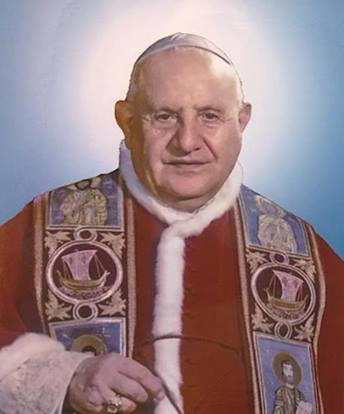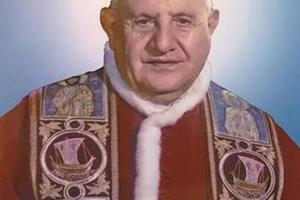Roncalli’s Eyes Were Always on the Prize
Special Section: John Paul II John XXIII: Papal Saints for the New Evangelization

Looking back at John XXIII’s life, we can see that it is intricately woven together, like a filigree, marked by his striving for sanctity, a difficult but possible goal." This is how the Italian historian Marco Roncalli, 55, described his great-uncle. Roncalli’s grandfather Joseph was the younger brother of Angelo Roncalli, who became John XXIII.
Roncalli has dedicated his life to the study of the popes of the 20th century, giving special interest to the "Pope of the Family," John XXIII. Thanks to Cardinal Loris Capovilla, John XXIII’s secretary, who was recently named a cardinal, Roncalli had access to several collections of unpublished documents. His last book is Papa Giovanni, il Papa Santo (Pope John, the Saint Pope). The saintly pope’s great-nephew was interviewed in Italian weeks before the canonization.
How would you describe John XXIII’s holiness? When did his sanctity become evident for the first time?
Angelo Giuseppe Roncalli always aimed at holiness. He worked to achieve it, but he was, above all, submissive and obedient to God, ready to be shaped by God. Gradually, Roncalli detached from his personal wishes and expectations and conformed to the Gospel, leaving aside any egocentrism. In every position he was entrusted, he aimed to be a saint. Not just a private sanctity that dealt with his personal relationship with God. He also aimed at holiness publicly, putting truth and love before everything else.
Who were John XXIII’s models?
Born in a Christian family, he entered the seminary very young. He was given saints as models.
Angelo Giuseppe Roncalli explained what holiness was to him at a conference in 1907. According to Roncalli, holiness means "being able to constantly dismantle yourself, destroying inside and around yourself anything you could be praised for; keeping alive in your heart the flame of a very pure love toward God, beyond secular love; giving everything, sacrificing yourself for the good of your brothers; and following the way of Providence through humiliations and in love for God."
That sanctity was Roncalli’s final goal is proven by what he wrote in his Journal of a Soul, when he was a young seminarian, at 17. "I must get to the point the saints have gotten to," Roncalli wrote.
In your view, which are John XXIII’s best quotes?
Speaking about the leitmotif of sainthood, there are several passages I consider the best quotes.
In another excerpt he wrote in the seminary, Roncalli said: "Jesus does not want from me, Angelo Giuseppe Roncalli, a mediocre virtue, but a high one: He is not happy with me until I become, or at least I am committed to becoming a saint."
During a spiritual retreat when he was an apostolic visitor to Bulgaria, he wrote: "I felt once more my duty to be a real saint. The Lord is not promising me 25 years of episcopal life. He tells me that, if I want to be saint, he gives me time and opportune graces."
When Angelo Giuseppe Roncalli was an apostolic delegate in Turkey, he reflected several times on the goal of sainthood. In 1937, he wrote, "What a duty it is for me to really become a saint! I am serene and happy about my state; only discontent that I am not so saintly and exemplary in everything as I should be, as I would like to be."
I could go on with several quotes from the period Roncalli was papal nuncio to France or patriarch of Venice. But I would like to stress a quote from the period he was pope: "Since everybody is calling me Holy Father, as if this was my first title, I must be and really want to be a saint."
How will John XXIII’s canonization be received?
In Sotto il Monte, John XXIII’s birthplace, there is a flurry of initiatives: conferences, spiritual retreats, publications, as well as concrete actions. For example, the priests of the Diocese of Bergamo gave one month of their earnings to works of charity. These actions, instead of making statues, are the best way to carry on John XXIII’s legacy. Devotion to John XXIII has been a 50-year-long phenomenon.
When John XXIII died, there had been a request to proclaim him a saint immediately. The same thing happened with John Paul II. How important was it to carry out the entire process of canonization?
Yes, several fathers of the Second Vatican Council asked to proclaim John XXIII a saint immediately, and there were also lay and Catholic commentators, as well as priests, who, back in 1963, wrote sentences like: "Let’s hope no one will require for him the miracle needed for the canonization process." Paul VI opted, with no disrespect, to proceed with the regular process of canonization, as Benedict XVI did for John Paul II (with the exception of the reduction of time needed).
It was a matter of responsibility, a choice, not to follow the emotion of the moment. In 1964, Cardinal Leo Joseph Suenens affirmed that the canonization would echo throughout the world if it was made in that moment, and he added: "Fifty years from now will be too late." Maybe Cardinal Suenens was not so gifted in prophecy.
What is John XXIII’s message to the Church today?
It is the message Pope Francis is now reiterating: We are born to be together, to help one another, to live the Gospel, to use as arms only those of mercy and forgiveness. It is the message of the Second Vatican Council, with the idea of the Church as a garden and not a museum; as a community and not as a monarchy with an almighty king.
The Council of John XXIII is still the North Star to orientate the path of sailors and eventually to change their route if it is wrong.
Is there any part of Roncalli’s life that fully exemplifies his personality?
I would say the homily he gave at the celebration of Pentecost in Turkey, where he was serving as apostolic delegate. It was 1944, and it was the last Pentecost Roncalli celebrated in Turkey. In the May 28, 1944, homily, we can find fully the spirit of Roncalli, set in the East, which was for him the school of ecumenism. I quote just an excerpt of that homily, which I consider the "Magna Carta of ecumenism": "Here, we Latin Catholics of Istanbul and Catholics of Armenia, Greece, [the] Chaldean, Syrian rite — we are a modest minority living on the surfaces of a vast world we are just superficially in touch with. We love to distinguish ourselves from those who do not profess our faith, from the Orthodox, Protestants, Israelis, Muslims, believers or nonbelievers."
Even if "diversity of race, language, education, painful contrasts of a sad past keep us in reciprocal distance," Roncalli stressed, "in the light of the Gospel," Jesus "has come to tear the walls down; he died to proclaim our universal brotherhood; the central focus of his teaching is the love that links every man to him as the first of brothers and that links him with us to the Father."
In these words, I find the very same man who, giving the same recommendations to his secretary when his death was approaching, said to Cardinal Capovilla: "Now, more than ever, we are meant to serve the human person as such, and not just Catholics: to defend above all and wherever the rights of the human person — and not just those of the Catholic Church. The current situation, the needs of the last 50 years, a more deep study of the doctrine led us to face new realms, as I said in the opening speech of the Second Vatican Council. It is not the Gospel changing. It is we who are starting to understand it better."
Andrea Gagliarducci is
the Vatican correspondent for Catholic News Agency/EWTN News.
- Keywords:
- April 20-May 3, 2014
















